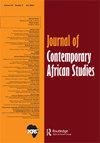Sugarcane Plantations and the Alienation of Land from Smallholder Farmers through Out-grower Schemes in Busoga Sub-Region in Eastern Uganda
IF 0.8
Q2 AREA STUDIES
引用次数: 0
Abstract
Despite wide research on land grabbing in Africa, much of the existing literature restricts the practice mainly to a situation where land is leased or sold to outside investors for the production of food and biofuel for export to the western world. This paper extends the debate further by examining how local sugarcane companies and individuals in Busoga Region in Eastern Uganda force smallholder farmers to surrender their land willingly through the out-grower schemes based on contract farming or private sugarcane production. Using a qualitative methodology that relied mainly on interviews of key informants and documentary reviews, the paper analyses the nature of the contemporary land alienations through contract farming between plantation agriculturalists and smallholder farmers, and how it has affected the livelihood of the peasants in the Busoga region especially when it comes to the production of sugarcane for sale at the expense of food for local consumption. The findings show that in the areas where sugarcane production through the out-grower schemes is the dominant economic activity, land alienation for sugarcane growing is rampant as the sugar companies and the agro-business farmers lure local peasants who mainly own land on customary tenure to grow sugarcane at the expense of producing food crops. The paper concludes that this is a new form of land grabbing in Uganda.乌干达东部布索加次区域的甘蔗种植园和通过外向型种植计划从小农手中转让土地
尽管对非洲的土地掠夺进行了广泛的研究,但许多现有文献将这种做法主要限制在将土地出租或出售给外部投资者以生产粮食和生物燃料以出口到西方世界的情况下。本文通过研究乌干达东部布索加地区的当地甘蔗公司和个人如何通过基于合同农业或私人甘蔗生产的外农计划迫使小农自愿交出土地,进一步扩展了这一辩论。本文采用定性方法,主要依靠对关键线人的访谈和文献综述,分析了当代种植园农民和小农之间通过承包农业进行的土地转让的性质,以及它如何影响布索加地区农民的生计,特别是当涉及到以牺牲当地消费食品为代价的甘蔗销售生产时。研究结果表明,在以“外农计划”生产甘蔗为主要经济活动的地区,甘蔗种植的土地出让现象十分猖獗,因为糖业公司和农业企业的农民引诱主要拥有传统权属土地的当地农民种植甘蔗,而牺牲粮食作物的生产。这篇论文的结论是,这是乌干达土地掠夺的一种新形式。
本文章由计算机程序翻译,如有差异,请以英文原文为准。
求助全文
约1分钟内获得全文
求助全文
来源期刊

Journal of Contemporary African Studies
AREA STUDIES-
CiteScore
2.20
自引率
0.00%
发文量
18
期刊介绍:
Journal of Contemporary African Studies (JCAS) is an interdisciplinary journal seeking to promote an African-centred scholarly understanding of societies on the continent and their location within the global political economy. Its scope extends across a wide range of social science and humanities disciplines with topics covered including, but not limited to, culture, development, education, environmental questions, gender, government, labour, land, leadership, political economy politics, social movements, sociology of knowledge and welfare. JCAS welcomes contributions reviewing general trends in the academic literature with a specific focus on debates and developments in Africa as part of a broader aim of contributing towards the development of viable communities of African scholarship. The journal publishes original research articles, book reviews, notes from the field, debates, research reports and occasional review essays. It also publishes special issues and welcomes proposals for new topics. JCAS is published four times a year, in January, April, July and October.
 求助内容:
求助内容: 应助结果提醒方式:
应助结果提醒方式:


